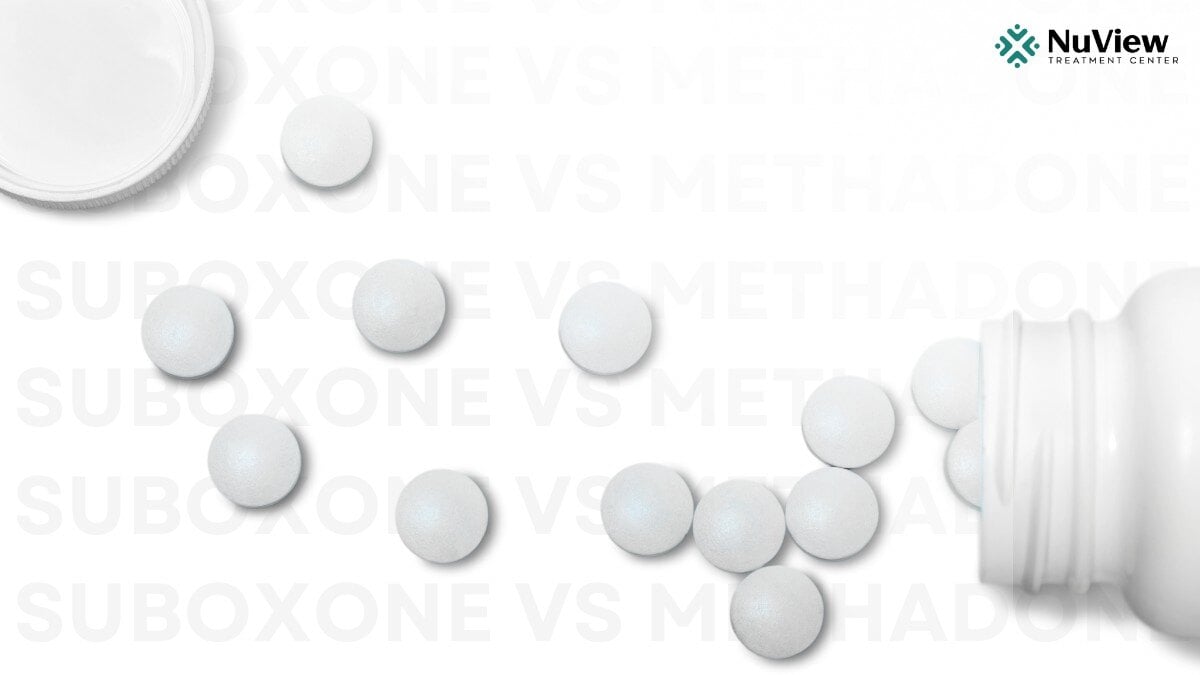Opioid Use Disorder or OUD is a chronic disorder characterized by dependence on opioids. It leads to many physical and mental health complications and impairs day-to-day functioning. In extreme cases, it can even lead to death, especially opioid overdose-related deaths. The World Health Organization reports that among 600,000 deaths related to drug overdose in a year, 25% were opioid-related deaths. Therefore, opioid use treatment is of utmost importance.
Methadone and suboxone are medications that are used in OUD treatment, and in this blog, we shall address how they compare to one another and what can be the best course of treatment in cases of OUDs.
What is Suboxone?
Suboxone is a brand name given for a medication consisting of buprenorphine and naloxone. Both of them work together to reduce cravings for opioids and withdrawal symptoms.
Buprenorphine is an opioid partial agonist. Meaning, it stimulates the opioid receptors in the brain, however, once it has reached its maximum effectiveness, increasing the dosage does not lead to more effectiveness. This is called the ceiling effect, which is absent in other opioids. In doing so, it reduces cravings for opioids and other withdrawal symptoms. Meanwhile, naloxone is an opioid antagonist. It blunts the effects of other opioids on the opioid receptors in the brain.
With buprenorphine and naloxone, Suboxone binds to the opioid receptors in the brain and prevents other opioids from binding to them. In doing so, it reduces their effects as well as the risk of overdose.
What is Methadone?
Methadone is an opioid agonist that works by binding to and stimulating the opioid receptors in the brain. It reduces the effects of other opioids by preventing them from binding to the opioid receptors in the brain and also reduces the withdrawal effects as well. As a consequence, it becomes easier to manage OUDs and prevent opioid overdose as well.
Get Started With Nuview Treatment Center
Our dedicated professional staff is here to guide you or your loved one on the journey to lasting recovery, offering support every step of the way.
What's the Difference Between Methadone vs Suboxone?
Coming to Methadone vs Suboxone, there are some differences to be noted.
Methadone has only one active ingredient, which is methadone. Meanwhile, Suboxone is a brand name for two ingredients, buprenorphine and naloxone.
Methadone is an opioid agonist, while Suboxone consists of buprenorphine, an opioid partial agonist, and naloxone, an opioid antagonist.
Methadone is prescribed in higher doses when compared to Suboxone and even the increase in dosage varies between these two medications.
Methadone has a higher risk of overdose than Suboxone, and the reason for this is mainly buprenorphine, which has a ceiling effect.
Safety during pregnancy also varies between Methadone and Suboxone, as there is a risk of Neonatal Abstinence Syndrome (NAS) with Methadone. This means that prenatal exposure to methadone can lead to newborn babies experiencing withdrawal symptoms. Suboxone is safer to take during pregnancy when compared to Methadone.
What Are the Benefits of Suboxone vs Methadone?
When it comes to the benefits of Suboxone vs Methadone, there are many benefits to consider. In these, they are similar in some ways.
Both are synthetic opioid medications and are safe and effective for long-term use and treatment, which is why they are used in medication-assisted treatment for OUDs.
As they both have the ability to bind tightly to opioid receptors in the brain, they reduce the chances of other opioids binding to the same, and in doing so, reduce their effects. At the same time, they ease withdrawal symptoms as well.
Both are controlled medications and are available under prescription only. They carry a risk of misuse, but their benefits in OUD treatment far outweigh these risks.
The outcomes of Methadone and Suboxone treatments have been positive. While they have their side effects, the scope for achieving long-term goals in managing OUDs is more promising.
So, while the benefits of Suboxone vs Methadone are more or less the same, some things to be considered here are that Suboxone dosing is lower than that of Methadone. Suboxone is also a safer medication to take during pregnancy.
Moreover, as per “Suboxone versus Methadone for the Treatment of Opioid Dependence: A Review of the Clinical and Cost-effectiveness,” the treatment completion rates for Suboxone increase by 1.5% when compared to Methadone and the number of deaths related to Suboxone treatment was 2.5 fold smaller when compared to Methadone treatment.
Get Started With Nuview Treatment Center
What Are the Risks And Side Effects of Suboxone vs Methadone?
Suboxone vs Methadone come with their risks and side effects. Some of the side effects to consider are quite similar to opioids, as they lead to withdrawal symptoms as well:
Anxiety
Low mood
Headaches
Vomiting
Increased heart rate
General feeling of sickness
Some of the long-term effects of Methadone are confusion, hallucinations, and sexual dysfunction. Meanwhile, with Suboxone, it can lead to respiratory depression.
Now, Suboxone interacts with certain drugs, which makes an overdose more likely, these are mainly –
Alcohol
Antihistamine medications
Hypnotics
Sedative medications
Methadone
Meanwhile, Methadone interacts with many drugs making overdose a potential risk as well –
Alcohol
Anxiolytics like Valium and Xanax
Cimetidine
Fluconazole
Fluoxetine
Therefore, these possible interactions must be taken into consideration before using either Suboxone or Methadone. To be on the safer side, it is always important to be clear with one’s doctor about the prescription and non-prescription medications they are taking and in cases of conditions affecting the nervous system, like dementia, head injuries, and increased intracranial pressure. These conditions can make taking either Suboxone or Methadone unsafe.
Withdrawal Symptoms: Comparing Suboxone and Methadone
When comparing Suboxone vs Methadone in terms of withdrawal symptoms, both give rise to symptoms like anxiety, depressed mood, vomiting, headaches, and rapid heart rate similar to opioids.
However, Methadone is more addictive than Suboxone with many taking Methadone almost for their entire life. In comparison to Methadone, the risk of overdose with Suboxone is also less likely, mainly because of the ceiling effect that tapers off the effects of the medication.
Now, it is important to keep in mind that Suboxone and Methadone carry a risk of misuse, therefore, it is always important to take the medication as prescribed by the doctor. Any side effects must be immediately reported to the doctor and any adjustments in dosage must only be done as instructed by the doctor.
Which Treatment Is Right for You?
Methadone and Suboxone are both effective treatments for OUDs. They come with their benefits and risks, and the doctor prescribes them after due consideration to the unique needs and circumstances of each client.
Overall, Suboxone carries lower risks than Methadone and is especially useful in reducing the risk of overdose.
Methadone treatment is highly structured and involves daily clinic visits, whereas Suboxone is more accessible and flexible, meaning it can be prescribed even in the more remote settings that do not have access to daily clinic facilities. It is also much safer during pregnancy when compared to Methadone. These factors make it a more popular choice for OUD treatment when compared to Methadone.
However, Methadone is preferred in cases of severe dependence on opioids, as it has agonist properties.
So, whether Methadone or Suboxone is the right treatment for a given person, depends on a variety of factors and this requires open and detailed conversations with the doctor. Medical advice and professional help are very important in OUD treatment, and any medication-assisted treatment must only be followed as per the doctor’s prescription and supervision.
Frequently Asked Questions
Why switch from Methadone to Suboxone?
Switching from Methadone to Suboxone is mainly because of reduced side effects and more flexible management of OUD treatment. However, any switch can only be done as per the doctor’s instruction and under their supervision.
What is Suboxone used for?
Suboxone is used in the treatment of Opioid Use Disorders or OUDs.
What is the 3 day rule for Suboxone?
The 3-day rule for Suboxone allows emergency doctors to administer Suboxone treatment for OUDs for no more than 3 days.
What are the worst side effects of Suboxone?
Suboxone does come with side effects like anxiety, vomiting, headaches, and so on. The worst can be considered increased heart rate and respiratory depression.
- What is Suboxone?
- What is Methadone?
- What's the Difference Between Methadone vs Suboxone?
- What Are the Benefits of Suboxone vs Methadone?
- What Are the Risks And Side Effects of Suboxone vs Methadone?
- Withdrawal Symptoms: Comparing Suboxone and Methadone
- Which Treatment Is Right for You?
- Frequently Asked Questions
- What is Suboxone?
- What is Methadone?
- What's the Difference Between Methadone vs Suboxone?
- What Are the Benefits of Suboxone vs Methadone?
- What Are the Risks And Side Effects of Suboxone vs Methadone?
- Withdrawal Symptoms: Comparing Suboxone and Methadone
- Which Treatment Is Right for You?
- Frequently Asked Questions
Get Help Today!
https://www.webmd.com/mental-health/addiction/difference-between-methadone-and-suboxone
https://www.medicalnewstoday.com/articles/suboxone-vs-methadone
Peddicord, A. N., Bush, C., & Cruze, C. (2015). A comparison of Suboxone and methadone in the treatment of opiate addiction. Journal of Addiction Research & Therapy, 6(4), 1-4.
Sivils, A., Lyell, P., Wang, J. Q., & Chu, X. P. (2022). Suboxone: History, controversy, and open questions. Frontiers in Psychiatry, 13, 1046648.
Ward, J., Mattick, R. P., & Hall, W. (1994). The effectiveness of methadone maintenance treatment: an overview. Drug and alcohol review, 13(3), 327-336.
Everyone is Welcome Here and We All Have Your Back
Your healing journey deserves a personalized approach. At NuView, we integrate expertise in behavioral therapy, mental health, and substance use treatment to create a customized recovery plan tailored to your unique needs.
Connect with our Admissions Specialists today.







Written By
Dr. Ryan Peterson